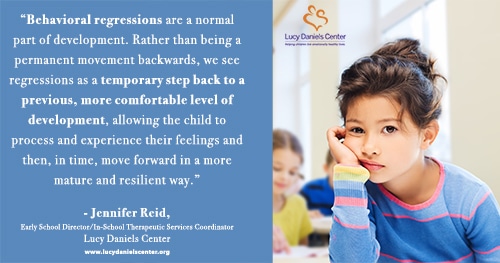Mental Health Mondays:
Behavioral Regressions in Children
by Jennifer Reid, MA
Early School Director/In-School Therapeutic Services Coordinator
Lucy Daniels Center
Changes in behavior usually indicate changes in feelings or a change in a sense of comfort and stability. In this period of extended school closures and modified family routines, younger children, who depend on routines, may be acting out or becoming clingier, and older children (elementary-aged and older) may be struggling to be independent students in their homes, without the physical presence of their teachers and the healthy social pressure of being in a group setting.
Behavioral regressions are a normal part of development. Rather than being a permanent movement backwards, we see regressions as a temporary step back to a previous, more comfortable level of development, allowing the child to process and experience their feelings and then, in time, move forward in a more mature and resilient way. Regressions often occur when a child is under stress or experiencing a significant change such as a move or a new sibling. When changes in behavior occur around such an event, children are best helped when the emotional impact of the change is brought to their attention.
Keeping the discussion going about what is different is a first step in helping a child recognize how their behavior is connected to their feelings. If children are most resistant during school activities, for example, gently commenting on how different it feels to be doing schoolwork at home, without their teacher’s help, may gradually bring to their attention that it isn’t the work that’s the problem, but rather their feelings about being away from school that are getting in the way of the task. Share these observations and conversations with your child’s teacher for more specific guidance depending on your child’s age and emotional needs.
For those children who have become less independent amid these lifestyle changes, meeting them where they are while conveying that you understand why it feels harder helps connect their need to depend on you to how they are currently feeling. Doing so doesn’t reinforce or encourage the regression, but instead will help develop a sense of how behavior and independence are tied to how stable and comfortable one feels. Showing compassion and understanding for the reasons for changes in behavior will ultimately lead children to become stronger, more self-aware, and increasingly independent.
Lucy Daniels Center is currently operating via telehealth services due to Covid-19. If you would like to request a consultation with a mental health clinician, please click here:https://tinyurl.com/slx79fe

